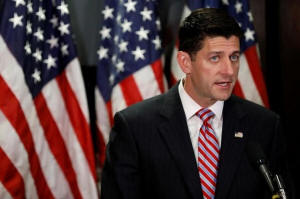|
Ryan says U.S. tax reform consensus
nears, does not mention border tax
 Send a link to a friend
Send a link to a friend
 [July 21, 2017]
By David Morgan [July 21, 2017]
By David Morgan
WASHINGTON (Reuters) - U.S. House Speaker
Paul Ryan said on Thursday that tax reform talks are nearing a consensus
to lower business taxes by closing loopholes and special interest
deductions, the latest sign that the unpopular proposed border tax may
not be included.
Speaking at a New Balance shoe factory in Massachusetts, Ryan stressed
the need to "level the playing field" for U.S. companies and their
foreign competitors but failed to mention the border adjustment tax, or
BAT, which has been his main policy for creating a more competitive U.S.
manufacturing base.
Ryan's remarks, coming about a week ahead of an end-of-July deadline for
top White House officials and Republican leaders in Congress to agree on
a tax reform framework, could indicate that President Donald Trump's
promised tax code overhaul is taking on a more orthodox shape after
months of closed-door talks.

Republicans in the House of Representatives had billed the BAT as a more
effective way to pay for tax cuts than closing loopholes, because it
would raise more than $1 trillion over a decade by effectively taxing
imports while exempting exports from taxation.
"We are going to slash the corporate tax rate to level the playing field
and the business tax rate for all businesses," Ryan told his audience.
"So what we need to do is, we need to throw out those complicated
loopholes, those deductions, those special interest loopholes," he
added.
Ryan said cutting the corporate tax rate from a current 35 percent rate
to a 20 percent corporate rate is "very realistic."
Administration officials have said negotiators realize Trump's proposed
15 percent corporate rate is unlikely without expanding the federal
deficit.
[to top of second column] |

Speaker of the House Paul Ryan speaks with reporters about the
forthcoming 2018 budget at the Republican National Committee in
Washington, U.S., July 18, 2017. REUTERS/Aaron P. Bernstein

White House budget director Mick Mulvaney said on Thursday that
Republicans should be willing to accept "short-term increases on
deficits" for tax reform to drive economic growth.
Ryan said tax reform would also include accelerating business
expensing, double the standard deduction for individuals, and retain
popular deductions for charity donations, home mortgages and
retirement.
"We have basically found where our consensus lies on these major
issues, which we think are sort of the key cornerstones of tax
reform," the Wisconsin Republican said.
His failure to mention border tax adjustment could fuel speculation
that House Republicans are moving away from the idea in discussions
among the so-called Big Six principals.
The six are Ryan, Senate Republican leader Mitch McConnell, Treasury
Secretary Steven Mnuchin, White House adviser Gary Cohn and the
Republican chairmen of two tax-writing committees.
(Additional reporting by David Alexander, Doina Chiacu and Roberta
Rampton; Editing by Chris Reese)
[© 2017 Thomson Reuters. All rights
reserved.]
Copyright 2017 Reuters. All rights reserved. This material may not be published,
broadcast, rewritten or redistributed.
 |